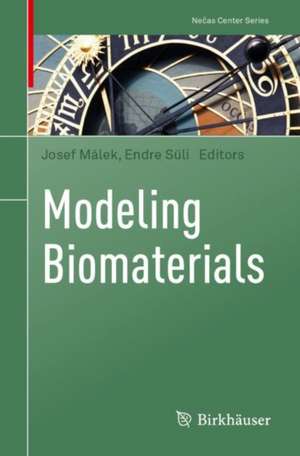Modeling Biomaterials: Nečas Center Series
Editat de Josef Málek, Endre Sülien Limba Engleză Paperback – 22 ian 2022
The investigation of the role of mechanical and mechano-chemical interactions in cellular processes and tissue development is a rapidly growing research field in the life sciences and in biomedical engineering. Quantitative understanding of this important area in the study of biological systems requires the development of adequate mathematical models for the simulation of the evolution of these systems in space and time. Since expertise in various fields is necessary, this calls for a multidisciplinary approach.
This edited volume connects basic physical, biological, and physiological concepts to methods for the mathematical modeling of various materials by pursuing a multiscale approach, from subcellular to organ and system level. Written by active researchers, each chapter provides a detailed introduction to a given field, illustrates various approaches to creating models, and explores recent advances and future research perspectives. Topics covered include molecular dynamics simulations of lipid membranes, phenomenological continuum mechanics of tissue growth, and translational cardiovascular modeling.
Modeling Biomaterials will be a valuable resource for both non-specialists and experienced researchers from various domains of science, such as applied mathematics, biophysics, computational physiology, and medicine.
Preț: 498.94 lei
Preț vechi: 586.98 lei
-15% Nou
Puncte Express: 748
Preț estimativ în valută:
95.47€ • 104.03$ • 80.45£
95.47€ • 104.03$ • 80.45£
Carte tipărită la comandă
Livrare economică 23 aprilie-07 mai
Preluare comenzi: 021 569.72.76
Specificații
ISBN-13: 9783030880835
ISBN-10: 3030880834
Pagini: 260
Ilustrații: IX, 276 p. 68 illus., 53 illus. in color.
Dimensiuni: 155 x 235 mm
Greutate: 0.41 kg
Ediția:1st ed. 2021
Editura: Springer International Publishing
Colecția Birkhäuser
Seria Nečas Center Series
Locul publicării:Cham, Switzerland
ISBN-10: 3030880834
Pagini: 260
Ilustrații: IX, 276 p. 68 illus., 53 illus. in color.
Dimensiuni: 155 x 235 mm
Greutate: 0.41 kg
Ediția:1st ed. 2021
Editura: Springer International Publishing
Colecția Birkhäuser
Seria Nečas Center Series
Locul publicării:Cham, Switzerland
Cuprins
Farago, O., A Beginner's Short Guide to Membrane Biophysics.- Misailidis, G., Ferenc, J., Tsiairis, C., Self-Organization of Tissues through Biochemical and Mechanical Signals.- Righi, M., Balbi, V., Foundations of Viscoelasticity and Application to Soft Tissue Mechanics.- Klika, V., Modeling of Biomaterials as an Application of the Theory of Mixtures.- Miller, R., et al., Modeling Biomechanics in the Healthy and Diseased Heart.- Chabiniok, R., et al., Translational Cardiovascular Modeling: Tetralogy of Fallot and Modeling of Diseases.
Textul de pe ultima copertă
The investigation of the role of mechanical and mechano-chemical interactions in cellular processes and tissue development is a rapidly growing research field in the life sciences and in biomedical engineering. Quantitative understanding of this important area in the study of biological systems requires the development of adequate mathematical models for the simulation of the evolution of these systems in space and time. Since expertise in various fields is necessary, this calls for a multidisciplinary approach.
This edited volume connects basic physical, biological, and physiological concepts to methods for the mathematical modeling of various materials by pursuing a multiscale approach, from subcellular to organ and system level. Written by active researchers, each chapter provides a detailed introduction to a given field, illustrates various approaches to creating models, and explores recent advances and future research perspectives. Topics covered include molecular dynamics simulations of lipid membranes, phenomenological continuum mechanics of tissue growth, and translational cardiovascular modeling.
Modeling Biomaterials will be a valuable resource for both non-specialists and experienced researchers from various domains of science, such as applied mathematics, biophysics, computational physiology, and medicine.
Caracteristici
Utilizes a multidisciplinary approach to develop a quantitative understanding of an active area of research Connects basic physical, biological, and physiological concepts to methods for modeling different materials Written to be accessible to both non-specialists and experienced researchers







